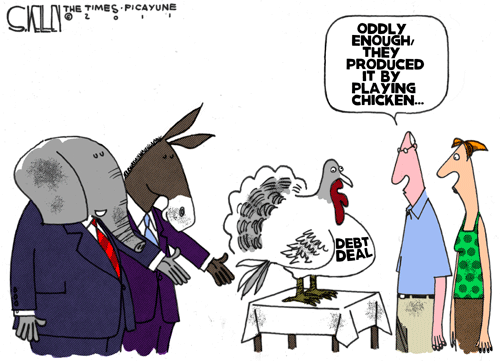The hard cold fact is unless they print it, there is not enough money in the world to cover Banksters gambling losses. They have bet on Black, hedged with Red, the wheel has stopped and the ball is now resting in that Green cup marked 00.
Debt talks falter, Greeks warn of disaster
By Dina Kyriakidou, Reuters
Fri Jan 13, 2012 2:13pm EST
“The main problem was the (European Union and International Monetary Fund’s) insistence on a coupon lower than 4 percent on the new bonds,” the banking source said.
That could mean an accounting loss of more than 70 percent for banks on their books, far more than the actual 50 percent cut in the original value of the old bonds laid down in the original deal.
Under the terms of the October plan, bondholders would take a 50 percent hit on the notional value of the old bonds. But the actual losses on their books depend on coupon and maturity of the new bonds, and could be far higher.
“When you’re dealing with a sovereign, you don’t have a huge amount of tricks up your sleeve, because if they choose not to pay you there’s not an awful lot you can do,” said Gary Jenkins, director of Swordfish Research.
…
Without using so called collective action clauses, the participation rate in any debt swap deal could be smaller than needed because many hedge funds would profit more if Greece defaulted because they would get paid in full from insurance.
“A lot of the (old) bonds have traded and are in the hands of the hedge funds. Do you think the governments are going to (pay out) to hedge funds? No way. So people like us, unless we are forced, we don’t have an incentive to accept,” said a source at a hedge fund, which owns Greek bonds.
Mark to Market can not be avoided forever and Mr. Market is going to have to realize a lot of this paper has a value of exactly zero. Banks will collapse and if there is any justice there will be crowds on the ledges.
Nations will not suddenly wink out of existence, but Sarkozy and Merkel may find new amounts of time to contemplate their failure.
France to Lose AAA Rating From S&P: Finance Minister
By Mark Deen, Bloomberg News
Jan 13, 2012 2:10 PM ET
Standard & Poor’s is stripping France of its AAA credit rating for the first time, Finance Minister Francois Baroin said, reflecting the risk to the country from the spread of the euro-area debt crisis.
Coming 100 days before France’s presidential elections, the ratings cut to AA+ is a blow for President Nicolas Sarkozy. Other countries in Europe were also notified by the ratings company, Baroin said, without being more specific.
…
The downgrade comes amid signs that France is slipping into a recession, complicating Sarkozy’s bid for re-election in voting in April and May.
…
Sarkozy trails his main rival, Socialist Party candidate Francois Hollande, by about 14 points in voting intention for the second round of the election, according to a BVA poll for Le Parisien newspaper published Jan. 9.
Stop coddling Europe’s banks
Morris Goldstein, Vox
11 January 2012
After initial denials, Europe’s leaders have started to acknowledge that IMF Chief Christine Lagarde was right. Through their statements and decisions, policymakers are showing their agreement with her assessment in August 2011 at the Federal Reserve’s Jackson Hole symposium that there was an urgent need for recapitalisation of Europe’s banks (Lagarde 2011).
…
(R)ather than converting that ratio into a target for increases in bank capital alone, the European Banking Authority (EBA) has increased the risk of a pro-cyclical response in a region where economic growth is fragile and weakening further.
This is because many banks may choose to reach the higher capital ratio as much by decreasing the denominator (shedding bank assets) as by increasing the numerator (raising bank equity). As an impressive body of research has shown, increasing bank equity need not be expensive or adverse for the real economy because the higher equity cushion makes bank equity safer and because the marketplace puts a positive value on such increased safety (Admati et al 2010); in contrast, reaching a higher capital ratio by restricting loan growth to the real economy and by engaging in fire sales of bank assets has an unambiguous contractionary effect.
…
Any EU bank that was below the capital target should have been directed to stop paying dividends until it reached the new capital target and until it was not in danger of falling back below it over the next year. Clearly, some large and under-capitalised EU banks are operating under no such constraints.
…
Neither the IMF nor the ECB seem to be rushing forward to give up their de jure or de facto preferred creditor status. All of this just increases the odds that future bank losses on sovereign debt will ultimately be assumed by the public sector and by taxpayers in the highly indebted countries – much to the detriment both of public-debt sustainability and of sustained public support for adjustment programmes. Once again, coddling the banks will impose higher costs on the rest of society.
…
To sum up, throughout this European debt and banking crisis, Eurozone leaders have expressed their determination to “do whatever it takes” to restore stability and save the euro. But if one examines the stance the official sector has taken toward banks, it looks much more like Eurozone leadership “takes (sheepishly) whatever its large banks do” – even when those actions are much more in the banks’ narrow interest than in the wider public one. It is high time for a change.
Wolf Richter: Greece – Disagreement Everywhere, Rift in the Troika
Wolf Richter, Naked Capitalism
Friday, January 13, 2012
(N)ow the Troika itself is in disarray. It surfaced today at an IMF press briefing in Washington: the IMF no longer supports austerity as a guiding principle.
…
The three Troika inspectors-Poul Thomsen from the IMF, Mathias Morse from the EU, and Klaus Mazouch from the ECB-are supposed to head to Greece next week to inspect its books; the budget deficit is once again higher than the revised limit that Greece had vowed to abide by. And they’re supposed to negotiate additional “structural reforms.” But there probably won’t be three inspectors, according to senior IMF sources. Missing: Poul Thomsen. The IMF has had enough.
Already, according to more leaks, IMF Managing Director Christine Lagarde had warned German Chancellor Angela Merkel and French President Nicolas Sarkozy that the fiscal and economic situation in Greece had deteriorated. Hence, the “voluntary” haircut on Greek bonds held by private sector investors should be increased to more than 50% to maintain the goal of bringing Greece’s debt load down to 120% of GDP. And the second €130 billion bailout package, agreed upon on October 26, should be enlarged by “tens of billions of euros.”
The German reaction was immediate. “There has to be a line somewhere,” said Michael Fuchs, deputy leader of Merkel’s party, the CDU. “This cannot be a bottomless barrel.” Even if Merkel were amenable to committing more taxpayer money to bail out Greece, she’d face a wall of opposition in her own party. And he wasn’t brimming with optimism: “I don’t think that Greece, in its current condition, can be saved,” he said.
…
It may be too difficult to keep Greece in the Eurozone, but allowing it to exit would be even more difficult, at least in the short term. And not only for Greece. It would be a shock to the Eurozone economy, which is already fragile. Even Germany, economic superstar with unemployment at a 20-year low and exports at an all-time high, has smacked into a wall. Read…. Germany’s Export Debacle.
Europe’s Road to Nowhere (Part 1)
Author: Satyajit Das, EconoMonitor
January 12th, 2012
Financially futile, economically erroneous, politically puzzling and socially irresponsible, the December 2011 European summit was a failure. Only the attending leaders and their acolytes believe otherwise. German Chancellor Angela Merkel’s post-summit homilies about the “long run”, “running a marathon” and “more Europe” rang hollow.
The proposed plan is fundamentally flawed. It made no attempt to tackle the real issues – the level of debt, how to reduce it, how to meet funding requirements or how to restore growth. Most importantly there were no new funds committed to the exercise.
…
The plan may result in a further slowdown in growth in Europe, worsening public finances and increasing pressure on credit ratings. This is precisely the experience of Greece, Ireland, Portugal and Britain as they have tried to reduce budget deficits through austerity programs. This would make the existing debt burden even harder to sustain. The rigidity of the rules also limits government policy flexibility, risking making economic downturns worse.
Fiscal controls may not prevent future problems. Until 2008, Ireland, Spain and Italy boasted a better fiscal position and lower debt than Germany and France. The weak economic fundamentals of these countries were exposed by the global financial crisis, leading to a rapid deterioration in public finances.
…
Unlike US banks in 2008/2009, European banks are reluctant to cut significant dividend payouts. Spanish bank Santander plans to pay shareholders Euro 2 billion in cash and more in stock (over 15% of its stated capital requirements). They argue the need to preserve their brand, compensate investors for poor share price performance and a return to profitability. Curiously, the EBA or the Bank of Spain has not intervened to force a suspension of dividends to husband capital.
…
Credit Agricole, the third largest French bank, is planning to reduce assets by around Euro 15-18 billion by the end of 2011 and by Euro 60 billion by end 2013. This will improve the bank’s capital position and also reduce its funding needs by Euro 50 billion. If all banks undertake similar actions, selling foreign assets and shutting (mainly overseas) operations, then the effect on the broader economy will be significant. The tighter credit conditions and lower economic activity may increase normal credit losses setting off a negative feedback loop.
Asset sales by European banks to improve capital are acceptable to the EU as long as they “do not lead to a reduced flow of lending to the EU’s real economy”. Withdrawal from foreign markets is already having a noticeable impact in Eastern Europe and Asia. A slowdown in these economies will indirectly affect Europe, reducing demand for European exports.
Europe’s Road to Nowhere (Part 2)
Author: Satyajit Das, EconoMonitor
January 13th, 2012
Sarko-nomics perpetuates the circular flow of funds with governments supporting banks that are in turn supposed to bail out the government. It does not address the unsustainable high cost of funds for countries like Italy. If its cost of debt stays around current market rates, then Italy’s interest costs will rise by about Euro 30 billion over the next two years, from 4.2% of GDP currently to 5.1% next year and 5.6% in 2013.
…
Debt reduction through restructuring remains off the agenda. The adverse market reaction to the announcement of the 50% Greek writedown forced the EU to assure investors that it was a one-off and did not constitute a precedent. Despite this, investors remain sceptical, limiting purchases of European sovereign debt.
…
Even Ireland, the much lauded poster child of bailout austerity, has experienced problems. The country’s third quarter GDP fell 1.9% and its Gross National Product fell 2.2% (the later is a better measure of economic performance due to the country’s large export/ transhipment activity). Ireland must reduce its budget deficit from 32% of GDP in 2010 to 3% by 2015. Despite spending cuts and tax increases, Ireland is spending Euro 57 billion euros including Euro 10 billion to support its five nationalised banks, against Euro 34 billion in tax revenue.
Spain, which has voluntarily taken the austerity cure, is missing economic targets. Spain’s budget deficit is above forecast (at 8% of GDP, it is a full 2% above the target agreed with the EU) and the need for support of the Spanish banking system may strain public finances further. Unemployment increased to over 21% (nearly 5 million people). Spain’s economic outlook is poor and deteriorating.
…
In the third quarter of 2011, Italy’s economy contracted by 0.2%. The government forecast is for a further contraction of 0.4% in 2012. The government forecasts may be too optimistic. Confindustria, the Italian business federation forecasts the economy will contract by 1.6% in 2012.
…
German export orders are slowing, reflecting the fact that the EU remains its largest export market, larger than demand from emerging countries. Germany exports to Italy and Spain total around 9-10 per cent in 2010), higher than to either the US (6-7%) or China (4-5%).
…
Greece faces elections in April 2011. The polls indicate a fractious outcome, with the major parties unlikely to gain majorities with significant representation of minor parties. An unstable government combined with a broad coalition against austerity may result in attempts to renegotiate the bailout package. Failure could result in a disorderly default and Greece leaving the Euro.
The French presidential elections, scheduled for May 2012, also create uncertain. The principal opponents to incumbent Nicolas Sarkozy either oppose the Euro and the bailout (the National Front led by Marine Le Pen) or want to renegotiate the plan with the introduction of jointly guaranteed Euro-Zone bonds (the Socialists led by Francios Holland).
The European debt crisis is also creating political problems in Germany, Netherlands and Finland, especially among governing coalitions. The risk of unexpected political instability is not insignificant.
In the weaker countries, austerity means high unemployment, reductions in social services, higher taxes and reduced living standards. Social benefits increasingly below subsistence are widening income inequality and creating a “new poor”. Protest movements are gaining ground, with growing social unrest.
…
A downgrade of Germany’s cherished AAA rating or any steps to undermine the sanctity of a hard currency (by printing money or other monetary techniques) will force increasing focus on the costs to Germans of the bailouts. Germany’s commitment to date is Euro 211 billion in guarantees, Euro 45 billion in advances to the IMF and Euro 500 billion owed to the Bundesbank by other national central banks – around 25% of GDP.
…
The debt is concentrated in countries where growth, productivity and cost competitiveness is low, which is what caused the problems in the first place. The relevant wealth is in the hands of a few countries like Germany that appear unwilling to bail out spendthrift and irresponsible neighbours. A substantial portion of the savings is also invested in European government debt directly or in vulnerable banks, which have invested in the same securities.
The total debt of the PIIGS (Portugal, Ireland, Italy, Greece and Spain) plus Belgium is more than Euro 4 trillion. A writedown of around Euro 1 trillion in this debt is required to bring the debt levels down to sustainable levels (say 90% of GDP). In the absence of structural reforms and a return to growth, the writedowns required are significantly larger. This compares to the GDP of Germany and France respectively of Euro 3 trillion and Euro 2.2 trillion.



 After having
After having
Recent Comments